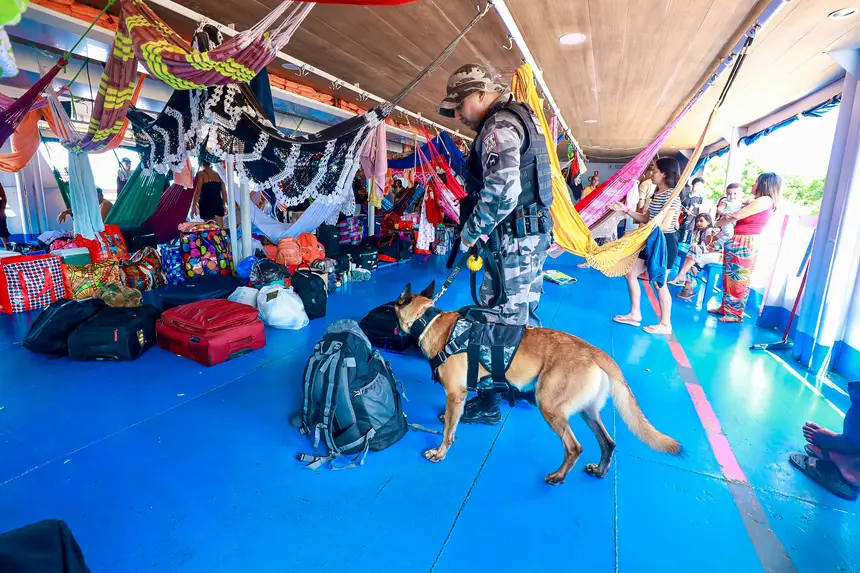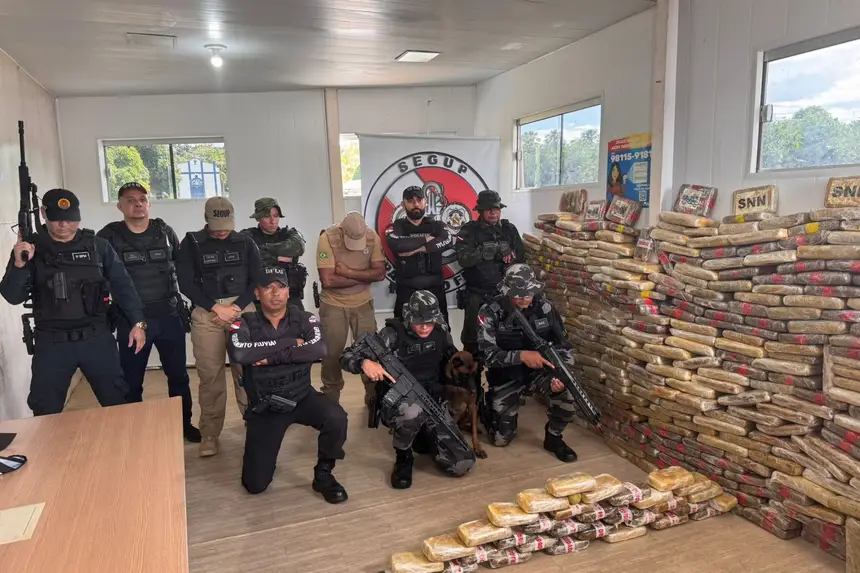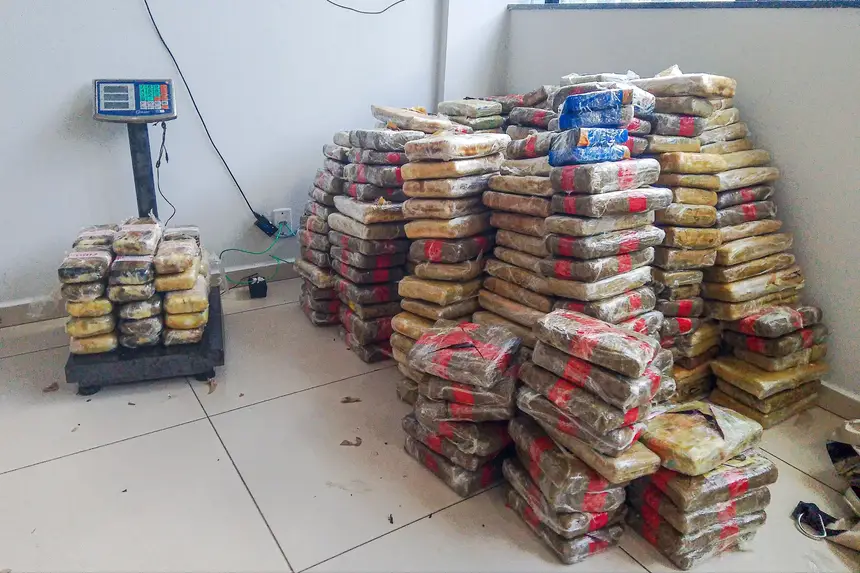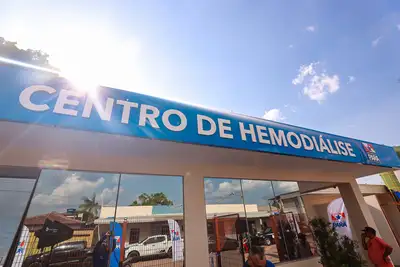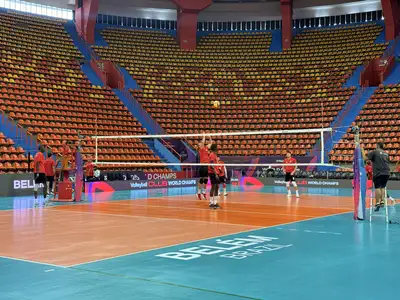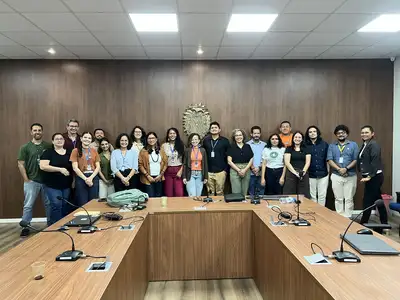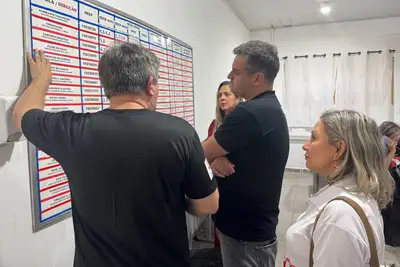In four months, Pará seizes over 6 tons of drugs
Integrated actions, investments in equipment and intelligence, and the establishment of river bases strengthen the fight against trafficking in the first four months of 2025
Investments in technology and intelligence, combined with the integration of security forces in Pará, resulted in the seizure of 6,161.397 kilograms of drugs in the first four months of 2025. This result represents an increase of 18.26% in the number of seizures compared to the four-month period of 2024, when the State seized 5,209.635 kg of narcotics. The data was presented by the State Secretariat for Public Security and Social Defense (Segup), through the Undersecretariat of Intelligence and Criminal Analysis (Siac).
According to the head of Segup, Ualame Machado, the seizures are the result of integrated work and security strategies, such as the acquisition of high-tech equipment, as well as the actions of intelligence agencies and a strong increase in policing on the rivers with the establishment of integrated river bases and the acquisition of fast and armored boats to enhance the offensive potential against crime.
“In 2024, we already had the highest number of drug seizures in the history of Pará, with over 13 tons. Now, in 2025, we are starting the fifth month of the year and have already surpassed 6 tons of drugs seized, about one ton more than was seized in the same period last year. This is certainly the result of investment in faster vessels, but also in the river bases, whether it is the Antônio Lemos Base in Breves, in Marajó, which has been operational for almost three years, or the Candiru Base in Óbidos, delivered just over six months ago, which has certainly further increased this quantity of seizures. By the end of this first semester of 2025, beginning of the second semester, we will be delivering the third integrated river base, the Baixo Tocantins Base, near Abaetetuba and Barcarena. All of this is to further combat drug trafficking and illegal activities on the rivers,” emphasized Ualame Machado.
Combating trafficking - In six years, the State has been surpassing the seizure mark each year, totaling 50,645.373 kg of seized narcotics - marijuana and cocaine - during this period, a significant increase compared to the years 2015 and 2018, when the State totaled the seizure of 11,415.986 kg.
The integrated security forces of the State operate on various fronts, with specialized teams combating drug trafficking and criminal groups that use river and land routes for transporting narcotics destined for countries in North America and Europe, informs the commander of the Military Police, Colonel Dilson Júnior.
“We know that Pará is a route for international drug trafficking. This drug is produced in the countries of the Andes and transported by the Amazon River with the aim of reaching the largest consumer markets, which are Europe and North America. Part of this drug is also trafficked to southern Brazil, through the Santarém-Cuiabá (BR-163) and Belém-Brasília (BR-010) highways, these major highways that connect northern Brazil with the southern, southeastern, and midwestern regions. We also have river routes, which have generated large seizures in the State, through the river bases, which have been an important strategy for police actions, especially with the essential assistance of the Military Police's sniffer dogs, which have been effectively helping us to discover drugs hidden on ships,” emphasizes Colonel Dilson Júnior.
The Civil Police, through the State Narcotics Division (Denarc) and the Sections and Delegacies installed in the municipalities, also carry out daily actions in combating trafficking and in police investigations for the capture and seizure of narcotics.
“Daily, our teams are combating drug trafficking, whether through large or small seizures, via local traffickers, from neighborhoods or streets, with information that reaches us through investigation or reports, with the collaboration of society, through the 181 hotline of Segup's Disque-Denúncia, aiming to understand the modus operandi of the criminal group focused on drug trafficking,” says Delegate Davi Cordeiro, director of Denarc.
Strategic investments - Through immediate and long-term strategies, the State's security forces invest in armaments, intelligence equipment, and above all, in integrated river security bases, such as the “Antônio Lemos” Base, installed in the river network of the Marajó Archipelago, on a route coming from Amapá, as well as the “Candiru” Base, which records large drug seizures due to its location in the strait of Óbidos, on the banks of the Amazon River, one of the most used routes by traffickers, especially due to its proximity to the border with the State of Amazonas.
The State also invests in the Military Police's Canine Action Battalion, for the breeding and training of animals that will act in drug trafficking combat actions. Through the canine maternity, the State can reproduce its own breeding stock and develops specific training for the dogs with sniffer skills, which are made available for police actions against trafficking.
The agents also receive training in intelligence, enabling integration between intelligence agencies, which allows for information exchange with other police units and with other states in the Federation.
Equipment - In investigative actions, the Civil Police of Pará has equipment, including Portable Scanners (X-ray), which facilitate the visualization of narcotic material hidden in objects and materials. All this enhancement has been used strategically and continuously in combating drug trafficking and confronting criminal groups.
“With all this investment and strategic actions, the trend is to increase the number of seizures each year and surpass our own results, thereby inhibiting drug trafficking and the organization of organized crime,” reiterates Ualame Machado.


